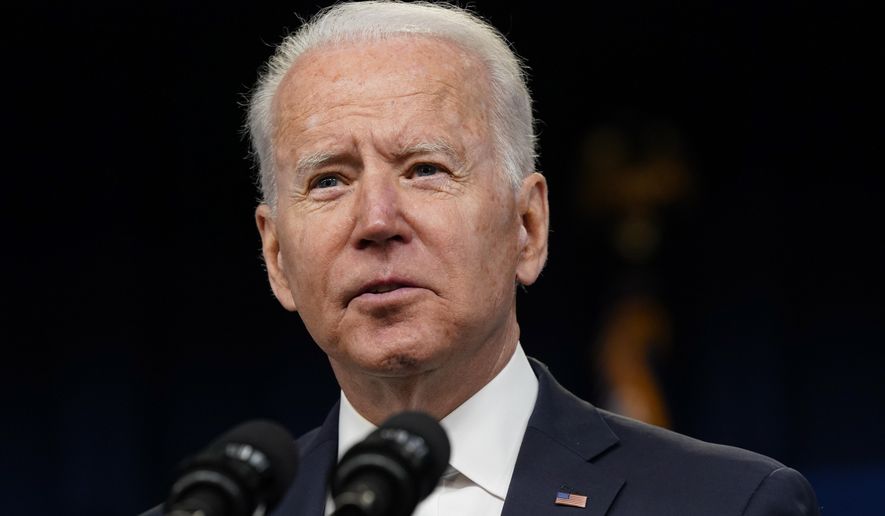Lawmakers are growing frustrated with the Biden administration’s silence on key details about the proposed evacuation for Afghan interpreters and others whose lives will be in jeopardy after U.S. troops leave the war-torn country at the end of the summer.
The administration’s turnover of the Bagram Airfield to Afghan security forces Friday marked a significant escalation in the withdrawal and signaled a complete drawdown well in advance of President Biden’s Sept. 11 deadline. The move comes amid increased warnings about a dire future for Afghanistan soon after troops leave, and few lawmakers are confident the administration has a comprehensive plan to ensure the safety of those who face Taliban retribution for providing support to the U.S. for two decades.
“Nobody to my knowledge on Capitol Hill has seen a plan,” Rep. Seth Moulton, Massachusetts Democrat and a Marine veteran who served in the Iraq War, told CNN’s Poppy Harlow on Thursday. “We need a plan that explains exactly where these men and women, these heroes, are going to go. How we’re going to get them to the airport, because some parts of Afghanistan have already been taken over by the Taliban. That’s changing week by week. We also need to have an operational commander, someone in charge of this mission so it’s clear who is directing this to get done. And finally, I need an assurance from the White House that no matter how long this takes, we’ll see the mission through to completion. We cannot leave anyone behind.”
Lawmakers on both sides of the aisle have grown increasingly vocal in their calls for the administration to act, citing an accelerating troop withdrawal timeline and a State Department visa process ensnared in a backlog of close to 18,000 applicants, which some estimate could take until next year to work through.
The administration said last month that it is preparing to relocate thousands of interpreters and others at risk of Taliban retaliation for their work for the U.S. during the nearly 20-year war, but provided few specifics.
“It’s looking more and more like the retrograde in Afghanistan could be completed within a matter of days, much less by the September 11th deadline set by the president,” Rep. Michael T. McCaul of Texas, the top Republican on the House Foreign Affairs Committee, told The Washington Times. “But we still have very few answers on the significant issues this hasty and ill-advised withdrawal is creating — including the fate of [special immigrant visa] applicants, realistic options for our [intelligence] capabilities, the security of our embassy and the airport, and plans for the promised humanitarian aid if things go south. With the Taliban advancing, Bagram now closing, and Gen. [Austin S.] Miller leaving the country, the Biden administration owes Congress and the American people real answers. The time for ’circling back’ is over.”
Rep. Mike Rogers, the top Republican on the House Armed Services Committee, echoed Mr. McCaul’s general frustration with the administration’s lack of a plan to protect U.S. national security interests in the country in a letter to Mr. Biden.
“In the three months since you announced the unconditional withdrawal of U.S. service members from Afghanistan, your administration has failed to provide Congress with a plan to conduct counterterrorism operations and protect remaining American citizens and our national security interests in the country,” wrote Mr. Rogers, of Alabama. “Now nearly all U.S. service members have been removed and the Taliban is seizing more territory each day. I am very concerned the failure to properly plan for security contingencies in Afghanistan could lead to the same chaotic environment that fostered the rise of al Qaeda 20 years ago.”
On Wednesday, Senate Foreign Relations Committee Chairman Robert Menendez, New Jersey Democrat, called on Secretary of State Antony Blinken to provide specifics of the plan.
“The United States has a moral obligation to these Afghans and their families who face persecution and threats to their lives because of their support for Americans in Afghanistan,” he wrote.
Bloomberg reported Friday that the administration asked Kazakhstan, Tajikistan and Uzbekistan to host the visa applicants while they wait for approval. Few other details have been provided by the administration, and White House press secretary Jen Psaki declined to confirm the three countries had been engaged.
Neither the State Department nor the National Security Council responded to The Washington Times’ request for confirmation.
Kim Staffieri, founder of the Association of Wartime Allies, an organization that advocates for interpreters awaiting visa approval, is adamant that the applicants should be evacuated to the U.S. rather than a third country while they wait. She said a significant portion of applicants are denied on their first review and must go through a lengthy appeal process. There is no guarantee, she said, that the countries will not send them back to await the appeal.
Ms. Staffieri, who is in daily contact with applicants, said the Afghanis are becoming increasingly desperate as the withdrawal nears. She said she is not confident that the Biden administration has a clear way to protect them.
“This evacuation should be ongoing already,” said Adam Bates, policy counsel for the International Refugee Assistance Project. “And the fact that we’re still here trying to figure out what, if any, plan exists is unconscionable.”
A former interpreter who still lives in Afghanistan told The Washington Times that the situation is quickly deteriorating.
“It’s getting worse day by day,” he said. He requested to remain anonymous out of fear of being targeted for his support for the U.S. He said the Taliban clash with the Afghan National Army daily in Kunduz, where he lives.
“I was thinking of a bright future for myself and my family,” he said about when he began supporting the U.S. “But, unfortunately it’s, you know, it’s the opposite right now.
“I can’t see any hope for prosperity or for a good future,” he said.
• Joseph Clark can be reached at jclark@washingtontimes.com.




Please read our comment policy before commenting.